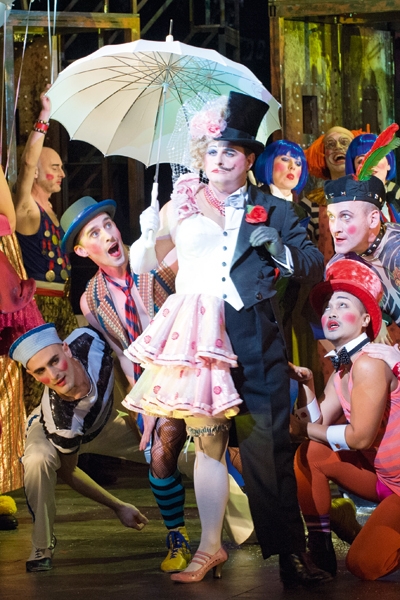As usual on the rare occasions when Vaughan Williams’s last and largest opera, The Pilgrim’s Progress, is performed, the new production at English National Opera has been greeted antiphonally, with cries of ecstasy mingled with indignation that it is so little performed from one side, and moans of boredom and weariness from the other. Though I am temperamentally disinclined or even unable to take a compromise position on almost any subject, in this case that is what I find myself doing. It seems to me that there are long stretches where The Pilgrim’s Progress is serene, noble, elevated, radiant and life-giving, others where it stalls, nothing much happens (in the music more than on stage) and it belies its title: progress is just what, sometimes, we don’t get. As well as the qualities listed above, the work needs to possess urgency, since it is Pilgrim’s immortal soul that is at stake.
Vaughan Williams was perfectly capable of expressing conflict, as the Fourth and Sixth symphonies show, but he seems better at doing it in the abstract, that is instrumentally, than with individuals or, as here, human types, where he can manage no vigour of illusion. One might have expected that Obstinate, Timorous, Lord Lechery and the rest of them would elicit suitable music, but none of them does. And when he gets to the comedy of Mister By-Ends the failure of characterisation is embarrassing.
Perhaps that is why I have been more moved by concert or semi-staged performances, above all the one given at Sadler’s Wells four years ago under Richard Hickox, with the superb Roderick Williams as Pilgrim, than I was by this production, which seemed to duck the difficulties that the work presents. The director, Yoshi Oida, has set it in a prison, though it is one which it is easy for people to enter, if not to escape from. That seems a mistake, since Pilgrim is a traveller, and needs to be felt to be moving along. For several scenes, it is necessary to add to the prison’s bars, and we do get views of the Delectable Mountains and of Vanity Fair. But in the latter no amount of cross-dressing and simulated nudity can make up for the threadbare music, and anyway the worst that the Fair is guilty of is an incitement to indiscriminate consumerism.
Yet with all reservations registered, this is an indispensably beautiful score, which should and will outlive many trendier postwar works that have been and in some cases still are widely admired. It has strength, it genuinely does radiate serenity and joy, perhaps fortitude, so that anyone who makes what admittedly is an effort of surrender is richly rewarded. Musically, the heroes of this production are Martyn Brabbins and the orchestra. Roland Wood is a sturdy but inexpressive Pilgrim, with plenty of tone and exemplary enunciation — all the cast has that — but one would like to see him suffer and rejoice more. The most vivid stage presence is Benedict Nelson as the Evangelist, possessed of a fine voice and commanding presence. The rest of the cast is adequate, though it could have been more imaginatively directed. Go while you can, it may be a long time before there is another chance.
Thomas Adès’s The Tempest, which was the latest cinema relay from the New York Met, presents an utter contrast to The Pilgrim’s Progress in that it is almost infallible in its theatrical know-how, it gets a move on after the less than stunning storm with which it opens, and gives an impression of never losing its way, though actually the plot is both diffuse and full of gaps, like Shakespeare’s play on which it is based, though the similarities are, in many respects, superficial. It is a staggeringly brilliant piece, though, thanks partly to Meredith Oakes’s skilful text, which has a fair number of Shakespearean echoes, but is in its own quasi-rhyming couplets, all of them instantly clear and ideally singable.
This Met production, with the composer conducting, is virtually perfect. Its strongest point, as in London, is the Prospero of Simon Keenlyside, a portrayal of such magnificent completeness that it can only be compared to the greatest handful of operatic characterisations. His voice must now be at its absolute peak — but how many recordings of it are there? There is no weakness in the large cast, though I preferred Ian Bostridge’s brilliant Caliban in London to Alan Oke’s in New York; and it felt, though this may be the result of living with the work for the past six years, as if Adès has deepened his understanding of his own score. Reflection on this opera yields some difficult questions, partly because of the tug between this Tempest and Shakespeare’s. The complexity of Prospero’s character is a puzzle in both, but a different puzzle, the most striking discrepancy being that in the opera he gives way to the power of love, a too-easy resolution, though no doubt the legion of Adèsives will disagree. Whatever reservations one may have, there seems no doubt that this opera is built to last.





Comments